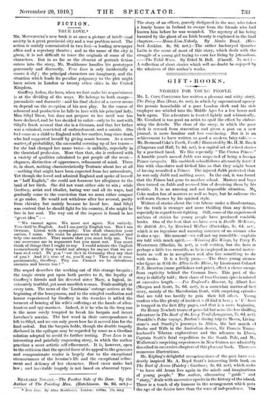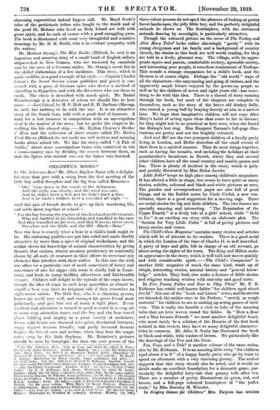GIFT - BOOKS.
STORIES FOR YOUNG PEOPLE.
MR. L. Corn Costacroan has written a pleasant and witty story, The Fairy Man (Dent, Os. net), in which by supernatural agency the prosaic households of a poor London clerk and his rich employer are whirled into the Middle Ages for a few hours and back again. The adventure is treated lightly and whimsically. Mr. Cornford is too good an artist to spoil the effect by elabor- ating the details. The close of the story, in which the poor clerk is rescued from starvation and given a post on a new journal, is more familiar and less convincing. But it is an achievement to have written so good a modern fairy-tale.---- Mr. Desmond Coke's Youth, Youth illustrated by Mr. H. M. Brock (Chapman and Hall, 7s. 6d. net), is a capital set of school stories by a practised hand. We like especially " The Crown Prince." A humble youth named Jubb was suspected of being a foreign Prince incognito. His snobbish schoolfellows alternately feasted him with chocolates and kicked him so that they might boast of having assaulted a Prince. The injured Jubb protested that he was only Jubb and nothing more. In the end, it was found that the Prince had gone to another school. Masters and boys then turned on Jubb and accused him of deceiving them by his denials. It is an amusing and not impossible situation. Mr. Coke makes fun of masters as well as boys, but he enlivens the well-worn themes by his spirited style. - Writers of stories about the war labour under a disadvantage, for the truth is stranger and more thrilling than any fiction, especially in regard to air fighting. Still, some of the experienced authors of stories for young people have produced readable books. One of the best that we have seen is Devine McKecne, the British Ace, by Rowland Walker (Partridge, 39. 6d. net), which is an ingenious and amusing romance of an airman who is also a spy. His unusual—we will not say ineredible—exploits are told with much spirit.— Winning His Wings, by Percy F. Westerman (Blackie, 5s. net), is well written, but the hero is perhaps a little too versatile, as ho is employed in coastal motor- boats as well as in aeroplanes and also has something to do with tanks. It is a lively yarn.---The three young airmen who figure in 1Vith the Allies to the Rhine, by Lieutenant-Colonel F. S. Brereton (same publishers and price), effect a clover escape from captivity behind the German lines. This part of the story is skilfully told ; their chase of two German spies is related at excessive length. For England's Honour, by Albert Leo (Morgan and Scott, 7s. 6d. net), is a somewhat matter-of-fact story, mainly of the Macedonian front, with surprising episodes that are told too hastily to gain their full effect. Young readers who like plenty of incident w ill find it here ; a ' U '-boat is trapped in the first fifty pages, and that is a mere beginning.
Sir Henry Newbolt treats of peaceful but none the less thrilling adventure in The Book of the Long Trail (Longman, 7s. Od. net). Franklin's Polar voyage, Burton's daring trip to Mecca, Living- stone's and Stanley's journeys in Africa, the last march (1 Burke and Wills in the Australian desert, Sir Francis Young- husband's Tibetan explorations and the advance to Lhasa, Captain Scott's fatal expedition to the South Pole, and Mr. Wollaston's surprising experiences in New Guinea are admirably described in successive chapters of this pleasant book. There aro numerous illustrations.
Mr. Kipling's delightful recoestructions of the past have evi- dently inspired Mr. A. Boyd Scott's interesting little book on The East of Arran (Paisley : Gardner; 3s. 6d. net), which seeks " to have old Arran live again in the minds and imaginations of young people." The author, alternating " guide " and " story," deals with successive epochs in the history of the island. There is a touch of sly humour in the arrangement which puts the age of the fairies later than the wars of independence. The
.charming superstition indeed lingers still. Mr. Boyd Scott's tales of the prehistoric tribes who fought to the death and of the good St. Molaise who lived on Holy Island are told with great spirit, and he ands of course with a good smuggling yarn. The took is illustrated with some very thoughtful and-sensitive drawings by ]fir. D. H. Rudd, who is in evident sympathy with the author.
Mr..Herbert Strang's The Blue Raider (Milford, 5s. net) is an ingenious and amusing story of a small band of English sailors, shipwrecked in New Guinea, who are harassed by cannibals and by the crew of a German raider. Mr. Strang's merit lies in the skilful elaboration of a few incidents. This story, which is quite credible, is a good example of his style.—Captain Charles Gilson's Os Secret Service (same publisher and price) is con- cerned with a gang of German spies who devise a method of signalling to Zeppelins, and with the detectives who run them to earth. The chase is described with much spirit. Mr. Daniel Wansborough is a detective of whom we should like to hear more.—Lost Island, by H. P. Holt and R. H. Barbour-(Harrap, Gs. net), has nothing to do with the war. It is an attractive story of the South Seas, told with a good deal of humour. A hunt for a lost treasure in competition with an unscrupulous rival is the motive of the story, but we prefer the chapters de. scribing the life aboard ship.—Mr. Hylton Cleaver's Brother e' Mine and the collection of short stories called The Harley First Eleven (Milford, 5s. net each) are well 'written and amusing books about school life. We like the story, called " A Pair of Swifts," about some unscrupulous twins who contrived to win a cross-country race by dividing the course between them, so that the Spicer who started was not the Spicer who finished.











































 Previous page
Previous page